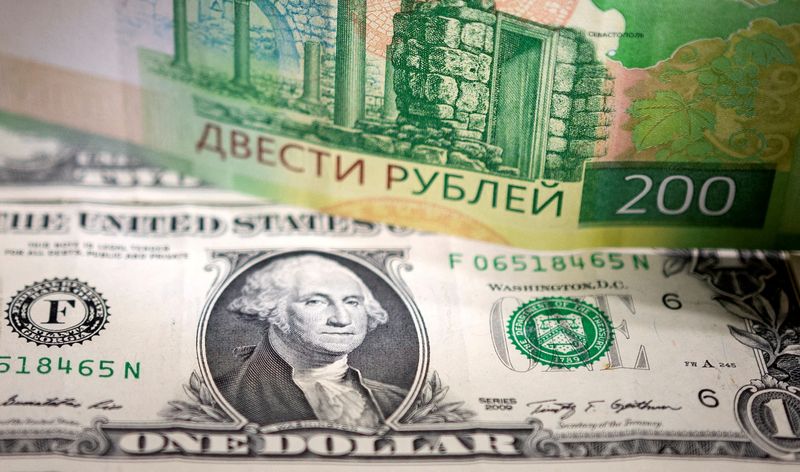 © Reuters. FILE PHOTO: Russian Rouble and U.S. Dollar banknotes are seen in this illustration taken, February 24, 2022. REUTERS/Dado Ruvic/Illustration/File Photo
© Reuters. FILE PHOTO: Russian Rouble and U.S. Dollar banknotes are seen in this illustration taken, February 24, 2022. REUTERS/Dado Ruvic/Illustration/File Photo
MOSCOW (Reuters) - The Russian rouble slumped to new record lows against the dollar on Thursday though it closed the Moscow session little changed, after Fitch and Moody's (NYSE:MCO) downgraded Russia's sovereign debt to "junk" status, with steps by the central bank and finance ministry failing to halt its slide.
Russia's financial markets have been thrown into turmoil by sanctions imposed over its invasion of Ukraine, the biggest attack on a European state since World War Two. The stock market remains closed and trading volume on its sovereign debt has vanished.
The rouble ended at 106.01 per dollar in Moscow from Wednesday's 106.02 close, after hitting an intraday record low of 118.35, down over 10% on the day.
Against the euro, it closed down another 1.9% at 117.60 after weakening past 125 for the first time ever during the session.
In foreign markets, the rouble was recently trading at 110 per dollar, down 9.1% on the day, with bids in other platforms close to 117 per dollar.
"You know trading is thin when the Bank of England and European Central Bank stop publishing quotes on the rouble exchange rate," said Brian Jacobsen, senior investment strategist for multi-asset solutions at Allspring Global Investments.
"The bid-ask spread is a measure of liquidity and you could drive a truck through that spread. The longer the situation plays out, the more economic damage will be done to the Russian economy and sellers of roubles will get more and more desperate while potential buyers get more and more hesitant to hold the currency."
Russia's invasion of Ukraine and the sanctions imposed in response have led to dire warnings about the Russian economy, with JPMorgan (NYSE:JPM) predicting a 35% contraction in the second quarter.
The Russian central bank imposed a 30% commission on foreign currency purchases by individuals on currency exchanges - a move brokers said appeared designed to curb demand for dollars - but there was little immediate impact.
The central bank on Thursday said it would not reveal the change in its gold and forex reserves, which are frozen by Western sanctions, through the next three months.
The finance ministry said it was halting purchases of foreign currency and gold this year as part of a suspension of parts of its fiscal rule - a move also aimed at easing pressure on the rouble.
Russia calls its actions in Ukraine a "special operation" that it says is not designed to occupy territory but to destroy its southern neighbour's military capabilities and capture what it regards as dangerous nationalists.
Since Russian troops entered Ukraine on Feb. 24 the rouble is down close to 30% against the dollar, and analysts say it will probably remain highly volatile.
The government has ordered Russian exporters to convert 80% of their foreign exchange revenues into roubles in another attempt to buttress the local currency, but people are still queuing up at banks to buy dollars as the rouble slumps.
Russia's five-year credit default swaps, which investors use to hedge against risk, fell to 1,250 basis points on Thursday from their closing level of 1,321 on Wednesday, but rouble implied volatility gauges rose to fresh record highs.
Goldman Sachs (NYSE:GS) noted that Russian financial conditions had tightened significantly. https://tmsnrt.rs/3C9UMcI
TRAPPED MONEY
"There's huge uncertainty around ongoing events, and there's going to be a lot of volatility, volumes will be a lot lower, liquidity will be incredibly poor," said Chris Turner, global head of markets at ING. "There's a lot of trapped foreign money in Russia at the moment."
On Thursday, Russia's National Settlement Depository said coupon payouts on Russia's OFZ government bonds which were due on Wednesday had only been made to local holders, citing a central bank order barring payments to foreigners.
Moscow is blocking foreign investors, who hold tens of billions of dollars worth of Russian stocks and bonds, from exiting those holdings. It has temporarily barred Russian companies from paying dividends to overseas shareholders, without saying how long the curbs will last.
Trading on the Moscow Exchange's stock section remained largely closed on Thursday, a fourth day of restrictions ordered by the central bank.
Overnight, Fitch said U.S. and European Union sanctions prohibiting any transactions with the Bank of Russia would have a "much larger impact on Russia's credit fundamentals than any previous sanctions."
Moody's said the severity of the sanctions "have gone beyond Moody's initial expectations and will have material credit implications."
S&P lowered Russia's rating to sub-investment grade last week.
On Wednesday, index providers FTSE Russell and MSCI said they would remove Russian equities from all their indexes, after a top MSCI executive earlier this week called Russia's stock market "uninvestable."

